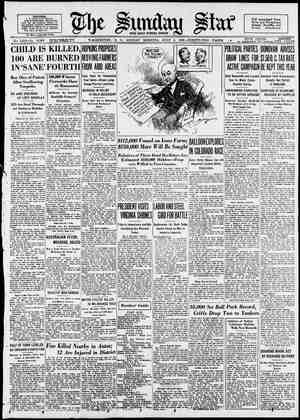Evening Star Newspaper, July 5, 1936, Page 62
You have reached the hourly page view limit. Unlock higher limit to our entire archive!
Subscribers enjoy higher page view limit, downloads, and exclusive features.
4 Magazine Section A REAL SHIP, NOT A PHANTOM — THE WESTERN DAWN — DEAD AHEAD! THIS WEEK by DoucLAs NEwTON HE Calantara’s siren roared like a blind- ed bull. John Farne, peering over the bridge dodger into the fog, strained his ears for a land echo. “No throwback yet, Mr. Nagle?'’ he said. ‘‘Nothing, sir,” his first officer answered. ““They say the Maiden Point blankets sound — or swings it away in some fashion.” Nagle spoke with an odd, thick hesitance that was both surly and nervous. John Farne knew why. Somewhere off the Calantara’'s port bow, perhaps a mile away, perhaps less, was the long, submerged reef under the Maiden where, in just such circumstances as these, the three last Farnes to follow the sea had been lost with all hands. John Farne could almost feel Nagle think- ing: ‘‘It was bound to come. The fog, the Maiden and the homeward passage always wait to catch a Farne — we’re as good as dead.” It was already a sea legend. To sail with a Farne was to sail with a Jonah. John Farne's great-grandfather, John Farne I, had started the thing. The Farnes had always followed the sea, commanding ships since the days of the first Atlantic adven- turers. Great-grandfather John had been the finest seaman of the line, more daring, fiercer of temper, with a grim will of his own — and more farsecing. It was he who first defied the tradition of his line by throwing over sail and becoming one of the first masters to risk a reputation in the then new-fangled iron=built steamers. But he had done more than defy tradition; he had split and ruined the family. He told them he was changing over because sail was doomed. When he made it plain that he also meant to withdraw all his money, a half of their holdings, from the Greywing Line and invest it ir the new Ironholt Steamship Com- pany, their bitterness turned to rancor, the more acrid because they had convinced them- selves that it was not shrewdness that swayed old John, but love-sick dotage. In his fifty-seventh year, a widower, and with a son of his own old enough to be standing for a second-mate's ticket, old John had fallen under the spell of Irene Withers, only daughter of Able Withers, owner of the new Ironholt Line. To old John's brothers and sisters, even to his own son, the woman explained every- thing. Senile infatuation had destroyed old John's commonsense, and he was ready to fling away solid Farne money in this gamble on smoke belching rattle-traps that could have no future outside bankruptcy. Tradition has it that his two seafaring brothers, Captain Adam and Captain Harry Farne, nearly fought him, so ugly was the tension. It was the shore-living brother, George, who prevented that. George, the fox- iest of ships' brokers, had a scheme that would serve even better. It involved a good deal of underhand financial trickery, whereby the stili insecure Ironholt Company could be wrecked into bankruptcy before old John could return to save it with Farne cash. A nasty bit of business, yet since there seemed no other way of preventing old John's making a fool of himself and ruining them, they all agreed to it, even old John's son, John I1. This was the cause of the tragedy. Old John got word of the treachery as he lay waiting on cargo in Clinton, his outward port and, after two days of fury and harry- ing on his loading, he turned the Western Dawn round for a record run home to Sarum. Perhaps his fury made him reckless; per- haps he was so confident in® the powers of steam that he overtried them; whatever it was, he pushed the Western Dawn as no other ship had been pushed before. Even when he reached the Maiden Passage, with its dread current sets and its deceptive wind-slants between close-hemmed shores, and found it blind with fog, he still drove his ship. Per- haps he felt that engines could claw him off any danger in time. In this he was dreadfully wrong. It was her very engines that drove the Western Dawn too quickly and too high onto the reef beneath the Maiden, breaking her back so sharply that she slid in halves into deep water, drowning all her passengers and crew before they had even grasped what happened. So Old John had died, a victim of un- sailorlike steam, the Farnes said, but there were those who held that his family had been the cause. Many men at Clinton had heard Old John raging against the treachery of his family. They had heard him swear an oath that he would make his kin pay for their July 5, 1936 Tradition said that no Farne could pass that spot in a fog —and live lllustration by Karl Godwin > black plotting if it cost him hell itself, When, less than a year later, fog caught Captain Adam Farne in the Maiden on his homeward run, and caused him to pile up the Gannet, crack clipper of the Greywing Line, on the very reef where his brother had died, and to the same total loss, men were not backward in declaring that old John was keep- ing his word; that even in death he was aveng- ing the wrong done to him and his woman. The talk increased four years later, for his other seafaring brother, Captain Harry, mas- ter of the Kestrel, a new steel fourmaster, went down at the same spot, and under the same conditions - - fog thick under the Maiden, and the Kestrel homeward bound. Men now held that there was that in the Y |
